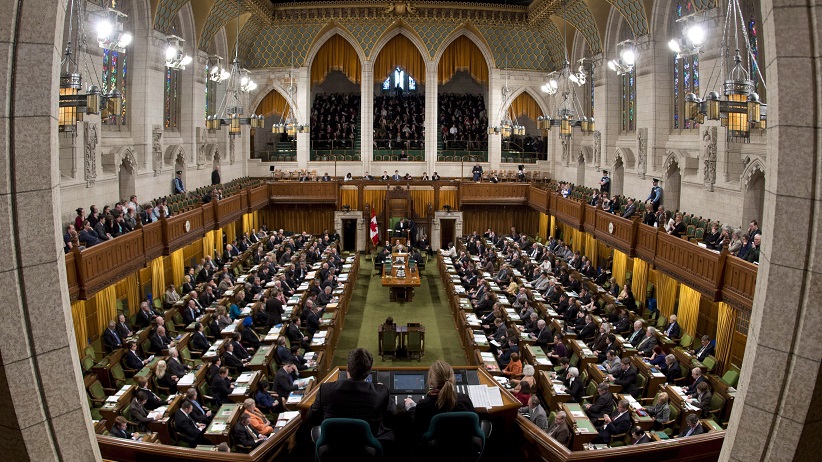Must-see QP: What counts as relevant during question period?
Your daily dose of political theatre
Share

Maclean’s is your home for the daily political theatre that is question period. If you’ve never watched, check out our primer. Today, QP runs from 2:15 p.m. until just past 3. We livestream and liveblog all the action.
The must-see moment
I’m on a fraught quest to calculate parliamentary productivity. If you’re late to the show, I started yesterday by punishing nasty personal politics and rewarding substantive agreement or disagreement on policy. This afternoon, I tweaked the scoring by adding punishments for lying, and opposition to both hypothetical policy and defeated governments. Ninety-four tests of my revised scorecard, together comprising the sixty minutes of today’s members’ statements, questions, and answers, revealed, once again, that productivity isn’t so easy to define. And so the fraught quest continues.
Here’s how the cumulative tally looks, adjusted after each exchange.
A brief explanation of the peaks and troughs: that early dip is common, and a reflection of the overt negativity of several Conservative members who, every day, oppose during members’ statements the apparent high-tax agenda of future New Democratic and Liberal governments. It’s criticism of the hypothetical, of an imagined policy not currently on the table, and so earns docked points. The second dip illustrates junior finance minister Kevin Sorenson’s tendency, same as his colleagues earlier, to oppose the scary tax policy of a future government led by one or both major opposition parties.
Later, a bizarre fit of cooperation between New Democrats and Conservatives, at the expense of Liberals down the way, brings us to a new deficiency in today’s scorecard. Exhibit A: NDP MP Charlie Angus and Foreign Minister Rob Nicholson, complaining about Pakistani consul-general Asghar Ali Golo’s recent participation in Liberal fundraisers—as well as an (eventually ignored) invitation to a similar event, extended by the Liberals to Chinese ambassador Luo Zhaohui.
Angus’s question to Nicholson took a much different tone than his typical indictments of government. “What do they intend to do to ensure foreign diplomats are not being used for domestic partisan purposes by particular parties?” he asked, to wide grins from colleagues from the two biggest caucuses. Nicholson’s reply stirred memories of softballs lobbed from his own benches. “Mr. Speaker, that is a wise question,” he said, jokingly, thanking the opposition party for its concern. “This is good. This is the kind of thing we have to have in question period.” But is it?
The tome that guides all conduct in the chamber, House of Commons Procedure and Practice, suggests deep within its pages that MPs ought to ask questions “within the administrative responsibility of the government or of the individual Minister addressed.” Any government has a clear interest in the conduct of foreign diplomats on Canadian soil, but are questions about the third party’s improper fundraisers a matter of the administrative responsibility of that government? Possibly, but there’s no consensus on the matter. In any case, Nicholson didn’t seriously answer the question.
The lingering question of exactly what’s relevant to House business and what isn’t traces back, most recently, to Tory MP Paul Calandra’s musings about the NDP’s position on Israel. He later tearfully apologized for what was a perfect non-answer, but later efforts to force relevant replies during question period failed miserably. It’s a messy and ongoing conversation.
Therein lies the ultimate challenge of assessing QP’s productivity: you can punish the lies, the fear-mongering of past and future governments, the clearly irrelevant, and the totally personal. But relevance is the enduring grey area. Tomorrow: a third attempt to score QP that considers that quandary. The quest continues.
The recap
The context
Yesterday, I attempted a subjectively conceived objective analysis of question period’s productivity. That scorecard rewarded people who opposed or supported the government on its merits, and punished people who got personal in a negative way. The analysis didn’t punish liars, nor those who opposed hypothetical future governments, nor those who opposed the policies of long-defeated governments, nor those who decided not to talk about government business. Today, again, I’m trying to sort out the useful from the useless. Here’s my revised scoring system:
+1 point: applause of a different party
+1 point: pledge to work together
+1 point: opposition to government policy on its merits
+1 point: defence of government policy on its merits
+1 point: member’s statement that doesn’t include a personal attack
-1 point: member’s statement that includes a personal attack
-1 point: reading a lie into Hansard
-1 point: asking a question unconcerned with government business
-1 point: opposing a hypothetical policy
-1 point: opposing a defeated government
Follow along, and we’ll tally it up again.